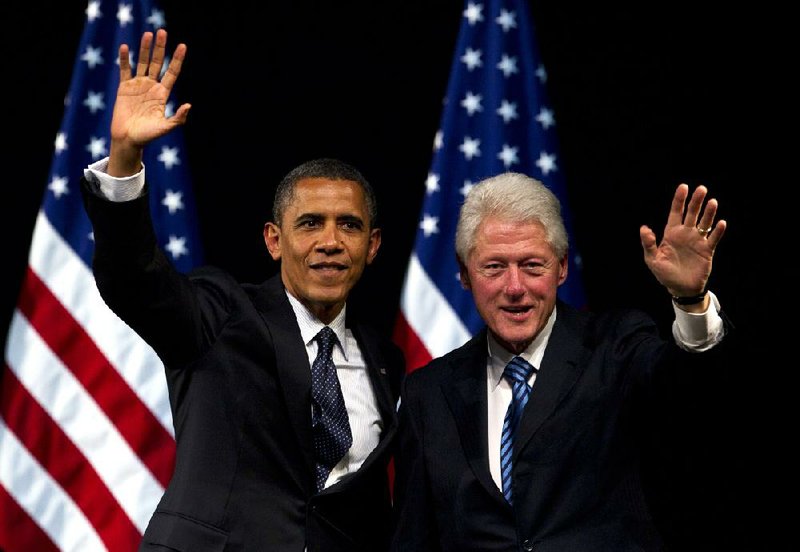WASHINGTON — Democrats on Monday tapped former President Bill Clinton to formally nominate President Barack Obama as the party’s pick for president.
It’ll be Clinton’s first presidential nominating speech since 1988, when he urged Americans to embrace Michael Dukakis.
In picking Clinton, Democrats hope to link Obama to the surging economy of the 1990s as he attempts to secure another four years in office. Clinton, a former Arkansas governor and two-term president, is to give his prime-time speech on the evening of Sept. 5, a Wednesday, when the Democrats meet in Charlotte, N.C.
“President Clinton oversaw the longest economic expansion in U.S. history, pursuing many of the same policies that President Obama is proposing and implementing today,” said Los Angeles Mayor Antonio Villaraigosa, who is the chairman of the convention. “There is no one better to lay out the choice in this election between moving forward with President Obama or falling backward with [presumptive Republican nominee] Mitt Romney.”
Republicans said Obama is no Bill Clinton.
“After four years of trillion dollar deficits and anemic economic growth, it’s clear President Obama would love to run on President Clinton’s record in office,” a statement from the Romney campaign said. “But no amount of showmanship can paper over the differences between these two presidents. Americans deserve a president willing to run on his own record, not the record he wishes he had.”
In picking Clinton, the Democrats have picked a veteran orator who has made several convention appearances. Clinton’s first big national speech, on behalf of Dukakis at the 1988 Democratic National Convention, was widely panned.
Delegates ignored much of the roughly half-hour-long speech by the 41-year-old Arkansan and broke into applause when they heard Clinton say, “In conclusion...”
Clinton spoke again in 1992 as a candidate, and again in 1996 as an incumbent - receiving a hero’s welcome both times. In 2000, 2004 and 2008 he spoke in support of the Democratic nominees, then-Vice President Al Gore, Sen. John Kerry of Massachusetts and Obama.
Each time, he brought the delegates to their feet.
As a speaker, Clinton is especially good at drawing distinctions between candidates and providing hope for a better future, said Will Bond, the chairman of the Arkansas Democratic Party.
In 2008 Obama lost in Arkansas by just under 20 percentage points to the Republican nominee, Sen. John McCain of Arizona. Bond said Obama will struggle this year, too, but said that outlook won’t dim the spotlight Democrats will focus on Arkansas’ most famous political son during their gathering.
“I don’t think it highlights [Obama’s] unpopularity,” in Arkansas, he said. “It highlights the fact that the last president to balance the budget was an Arkansas Democrat.”
Arkansas Republicans said choosing Clinton would backfire.
“President Bill Clinton, who signed a bipartisan welfare-reform bill that President Obama recently gutted, will remind Arkansans of how far to the left the Democratic Party has moved and why conservatives in his former home state are finding a new home in the Republican Party,” said Doyle Webb, chairman of the Republican Party of Arkansas.
Dewey Clayton, a political science professor at University of Louisville in Kentucky, called picking Clinton “a very good move.”
Clayton predicted the presidential race will be extremely close. Turning out the vote, he said, would be essential to secure a victory.
During the 2008 race, when Bill Clinton’s wife, Secretary of State Hillary Clinton, and Obama were locked in a tight race, Clinton disparaged the Obama campaign, further winding up a tense race.
But by the time of the Democratic National Convention in Denver, Bill Clinton was firmly behind Obama.
Clayton said the Obama campaign saw Clinton as essential to attracting blue-collar voters.
“Clearly Bill Clinton is seen as someone who can motivate and energize many Democrats who may be on the sidelines,” he said. “Clearly he’s a big gun. He’s still considered the big dog.”
But Clayton warned that the Obama campaign should take great pains to make sure Clinton doesn’t go “off message.”
“If they can keep him somewhat scripted, that will be a plus,” he said.
Other former presidents have returned to the convention stage.
Ronald Reagan returned, to great acclaim, in 1992, when he rallied Republicans behind George H.W. Bush. Ex-presidents Jimmy Carter, Gerald Ford, Herbert Hoover and Harry Truman made appearances. Former President Eisenhower joined the 1968 Republican delegates by telephone. President Nixon, who resigned from office in 1974, never gave an address to fellow Republicans after he left the White House.
Often, former presidents are not given the prime-time television slot Democrats have set for Clinton.
“They frequently show up and wave,” said William Benoit, a political science and communications professor at Ohio University.
Former Presidents George H.W. Bush and his son George W. Bush have both declined invitations to appear at the Republican National Convention later this month in Tampa. George W. Bush also did not join Republicans when they nominated McCain four years ago.
“On balance, I think they’re kind of happy he wants to stay away,” Clayton said.
While in office Clinton, who was impeached by the House of Representatives but spared by the Senate, made plenty of enemies.
Benoit said that after presidents leave office, they typically tend to become more popular because they get respect for having served in office and they no longer risk offending different special-interest groups because they are no longer in the day-to-day business of making policy.
“There are some who still dislike Clinton intensely,” Benoit said. “Those people are never going to vote for Obama anyway.”
Front Section, Pages 1 on 07/31/2012

